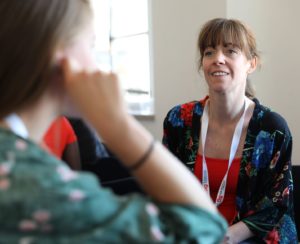Using interviews to reveal changes in your Big Local area
Understanding the changes that Big Local is making in your area is a central part of the programme. But how can positive changes be measured? Sue Ansarie, research assistant at Local Trust, looks at how interviews can be a great way of understanding and sharing stories of change in Big Local areas.
An interview is a ‘conversation with purpose’ – where you can ask about things more generally or on a specific topic. Interviews can be done by anyone with a little bit of guidance. There are lots of different ways that you can do interviews – either individually or as a group, by phone, video call, online, or in person.
There are a number of different interview styles you may want to use to get different types of information. You can choose how to ask questions and whether you want questions to be pre-planned in a list or ask as you go along. No matter how you choose to do your interviews, they should all be recorded in some way. If you want more detailed information about interviews and how to do them, look at ARVAC’s guide to community research.
Why are interviews a good way of capturing change?
Interviews give people a voice and an opportunity to share their opinions on particular topics. They are a rich source of information that can help build stories on change. Interviews can help people to open up and provide information on complex topics, such as people’s attitudes towards their community and their opinion on changes made.
Paul Wright and a team of partnership members and residents from Firs and Bromford Big Local do interviews in their area door to door, as part of their ‘Street Connectors’ project. This has been on hold during the pandemic lockdowns but they are looking at restarting again once restrictions lift. In his blog, Paul talks about the benefits of doing interviews:
“I believe interviews help us to better understand our story, tell our story, own our story and share our story with others… It helps us to discern where attention, energy, time and financial resources in our neighbourhood should be focused.”
Things to think about when doing interviews
Interviews can take a bit of time, especially if you want to do quite a few of them. It’s important that if you choose to do interviews, that you think about how much time you have to dedicate to conducting interviews and then using the information. Some people might not like or want to give an interview and some might lack trust or confidence to talk.
Sometimes questions that are asked can be leading, which means people are encouraged to give a specific answer. It’s good to keep questions open so that you capture different views.
Don’t forget, interviews are also a good way of collecting information from partnership members. They are the ones at the forefront of change in Big Locals and their stories and experience of being involved are great to share.
How are interviews captured?
There needs to be some kind of record of an interview, whether it is recorded, which you can do on your smartphone, recorded on Zoom or summarised in notes. Whatever way the interview is recorded, it is important to get the agreement of participants. Once the interviews are done it’s really important to keep any records safely stored.
During lockdown Zoom has become a much more popular and effective way to interview people remotely. It can seem less intrusive to some people and save on travel expenses or finding a mutual venue.
Would you like to know more?
The research team at Local Trust are keen to hear from areas wanting to know more about measuring change. You can email research@localtrust.org.uk or call 020 3588 0575.

